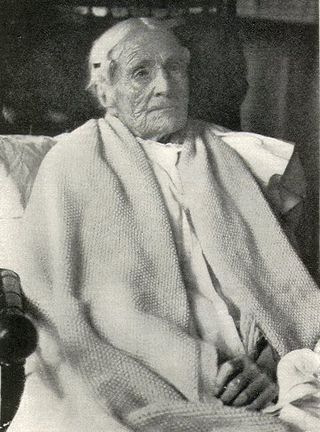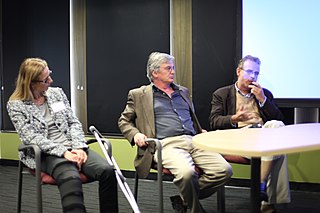
Catania is the second largest municipality in Sicily, after Palermo, both by area and by population. Despite its reputation as the second city of the island, Catania is the largest Sicilian conurbation, among the largest in Italy, as evidenced also by the presence of important road and rail transport infrastructures as well as by the main airport in Sicily, fifth in Italy. It is located on Sicily's east coast, at the base of the active volcano, Mount Etna, and it faces the Ionian Sea. It is the capital of the 58-municipality region known as the Metropolitan City of Catania, which is the seventh-largest metropolitan city in Italy. The population of the city proper is 311,584, while the population of the Metropolitan City of Catania is 1,107,702.

Senescence or biological aging is the gradual deterioration of functional characteristics in living organisms. The word senescence can refer to either cellular senescence or to senescence of the whole organism. Organismal senescence involves an increase in death rates and/or a decrease in fecundity with increasing age, at least in the latter part of an organism's life cycle.
A supercentenarian is a person who has reached the age of 110 years. This age is achieved by about one in 1,000 centenarians. Supercentenarians typically live a life free of major age-related diseases until shortly before the maximum human lifespan is reached.
The USC Leonard Davis School of Gerontology is one of the seventeen academic divisions of the University of Southern California in Los Angeles, focusing in undergraduate and graduate programs in gerontology,
Carlo M. Cipolla was an Italian economic historian. He was a member of both the American Academy of Arts and Sciences and the American Philosophical Society.
Antonei Benjamin Csoka, Ph.D. is a biogerontologist at Howard University who works on the molecular biology of aging, regenerative medicine, and epigenetics.
The following outline is provided as an overview of and topical guide to life extension:
Robin Holliday was a British molecular biologist. Holliday described a mechanism of DNA-strand exchange that attempted to explain gene-conversion events that occur during meiosis in fungi. That model first proposed in 1964 and is now known as the Holliday Junction.

The Journals of Gerontology are the first scientific journals on aging published in the United States. The publication is separated into four separate peer-reviewed scientific journals, each with its own editor, and published in two series. The Journal of Gerontology: Biological Sciences and the Journal of Gerontology: Medical Sciences are housed within The Journals of Gerontology, Series A; the Journal of Gerontology: Psychological Sciences and the Journal of Gerontology: Social Sciences are housed within The Journals of Gerontology, Series B. The journals are published by Oxford University Press on behalf of The Gerontological Society of America.
Paola S. Timiras, born Paola Silvestri, was an endocrinologist studying stress.

Napoleone Ferrara, is an Italian-American molecular biologist who joined University of California, San Diego Moores Cancer Center in 2013 after a career in Northern California at the biotechnology giant Genentech, where he pioneered the development of new treatments for angiogenic diseases such as cancer, age-related macular degeneration (AMD), and diabetic retinopathy. At Genentech, he discovered VEGF—and made the first anti-VEGF antibody—which suppresses growth of a variety of tumors. These findings helped lead to development of the first clinically available angiogenesis inhibitor, bevacizumab (Avastin), which prevents the growth of new blood vessels into a solid tumor and which has become part of standard treatment for a variety of cancers. Ferrara's work led also to the development of ranibizumab (Lucentis), a drug that is highly effective at preventing vision loss in intraocular neovascular disorders.

GeroScience is a scientific journal focused on the biology of aging and on mechanistic studies using clinically relevant models of aging and chronic age-related diseases. The journal also publishes articles on health-related aspects of human aging, including biomarkers of aging, multisystem physiology of aging and pathophysiology of age-related diseases.
Valter D. Longo is an Italian-American biogerontologist and cell biologist known for his studies on the role of fasting and nutrient response genes on cellular protection aging and diseases and for proposing that longevity is regulated by similar genes and mechanisms in many eukaryotes. He is currently a professor at the USC Davis School of Gerontology with a joint appointment in the department of Biological Sciences as well as serving as the director of the USC Longevity Institute.
Sean Curran is an American gerontologist who is Professor of Gerontology and Vice Dean at the USC Davis School of Gerontology with joint appointments in Molecular and Computational Biology. He also serves as the Dean of Faculty and Research. His expertise is the molecular genetics of healthspan and longevity with an emphasis on biology, genetics, nutrition, and diets.
Decio Vinciguerra was an Italian physician and ichthyologist who for many years was Director of the Aquarium of Rome.
The British Society for Research on Ageing (BSRA) is a scientific society which promotes research to understand the causes and effects of the ageing process. The BSRA encourages publication and public understanding of ageing research and holds an annual scientific meeting. Many notable scientists with an interest in ageing are either past or current members of the organisation, which has exerted a marked influence on ageing research within the United Kingdom and internationally.

Giulio Maria Pasinetti is the Program Director of the Center on Molecular Integrative Neuroresilience and is the Saunders Family Chair in Neurology at the Icahn School of Medicine at Mount Sinai (ISMMS) in New York City. Pasinetti is a Professor of Neurology, Psychiatry, Neuroscience, and Geriatrics and Palliative Medicine at ISMMS.

Christoph Bock is a German bioinformatician and principal investigator at the Research Center for Molecular Medicine (CeMM) of the Austrian Academy of Sciences and a visiting professor at the Medical University of Vienna.
This timeline lists notable events in the history of research into senescence or biological aging, including the research and development of life extension methods, brain aging delay methods and rejuvenation.
Manlio De Domenico is an Italian physicist and complex systems scientist, currently Professor of Physics at the University of Padua and previously at the Fondazione Bruno Kessler in Trento (Italy). In 2014 he has co-founded the Mediterranean School of Complex Networks, and in 2019 he has contributed to found the Italian Chapter of the Complex Systems Society.






